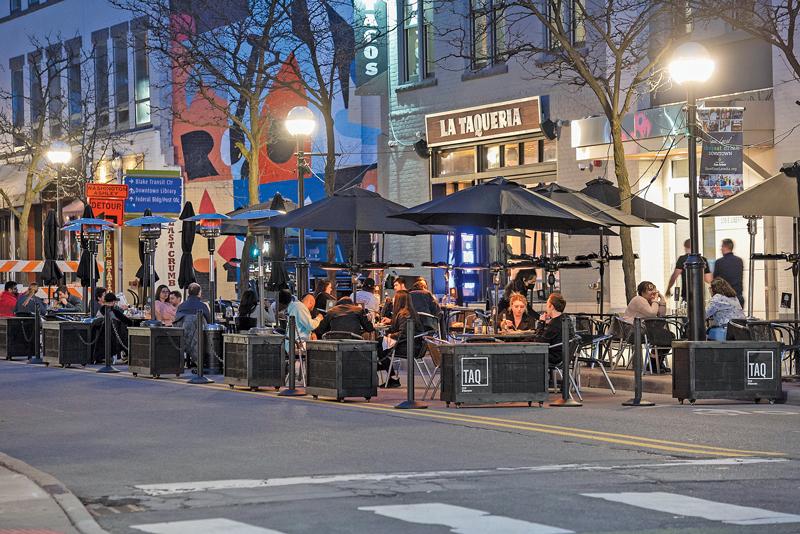Governor Gretchen Whitmer’s April recommendation that restaurants pause indoor dining for two weeks during the surging pandemic was just that: a recommendation, not a mandate. And Kevin Gudejko, president and CEO of Mainstreet Ventures, which includes Palio, Gratzi, Real Seafood, the Chop House and Carson’s, has no plans to pause.
“I prefer to leave it up to the guests to decide,” he says. “Same thing with our employees: I don’t force anybody to work.”
“It would be a good idea if people followed the recommendation, but I don’t have confidence that people will,” says Phillis Engelbert, owner of the Detroit Street Filling Station and the Lunch Room Bakery & Café. So she’s keeping her vegan eateries closed.
Their dissimilar positions reflect their dissimilar pandemic experiences. When it first hit last March, “we saw our income cut in half or maybe even more within the span of one week,” says Engelbert. “It felt like every day was a slow march towards financial death.” She quickly folded her original Lunch Room in Kerrytown into the Filling Station, which was already doing carryout—”we just had to learn how to do it better and bigger.” They did, and though total sales are down 22 percent since the closure, she says her remaining locations are doing better than ever.
Gudejko had it worse: his business immediately dropped 90 percent and went from 300 employees to thirty. He says three things saved them. Because Mainstreet Ventures also has restaurants in states with fewer restrictions, “we still had revenue coming in.” Ann Arbor’s expanded street and sidewalk dining during the warm months was “a lifesaver.” And though they had never offered it before, “during the bulk of the shutdown we went all carryout.”
But that wasn’t nearly enough to recover the lost sit-down business. Engelbert “has got a model that works for her,” Gudejko says. “But in fine dining typically you just don’t get a whole lot of volume from it.”
In April, outdoor dining expanded again. The Downtown Development Authority has agreed to pay up to $40,000 for sidewalk occupancy permits, and up to $50,000 for street closures. W. Washington from Ashley to Main and the east side of Maynard from Liberty to William will close at least through August, while Main and State from William to Washington and Liberty from Ashley to Fourth will close Thursdays at 4 p.m. and reopen Mondays at 6 a.m.
“It’s gonna look like it did last year,” Maura Thomson, the DDA’s interim director, explains by phone, “people spread out into the street, plenty of room to safely walk around and stroll downtown, plenty of room to be spaced if you’re having dinner or drinks or shopping. And people are going to see, I hope, family and friends and people that they haven’t seen for a long time—because I think we’re all so hungry to be together again.” Most likely: in an informal poll of the Observer’s Instagram account (@aaobserver), 87 percent of respondents welcomed the closures.
With offices closed and shopping and dining limited, the DDA expects to collect $14 million in parking revenues this fiscal year, $11 million less than projected. “We’ve had to cut expenditures dramatically,” Thomson says. And “the city relies on 20 percent of parking revenue for the general fund, so that’s a hit to the city.”
The downtown business associations lost money from the canceled art fairs, as well as other events like the Rolling Sculpture Car Show and the Taste of Ann Arbor. The fairs expect to announce their plans this month; the car show has yet to decide, and Taste of Ann Arbor is hoping for late in the summer.
Gudejko predicts “this is going to be a great summer” for downtown. “There’s a pent-up demand without a doubt.”
“If we want to have a great summer, we have to make smart choices,” warns Engelbert. In April, she wrote an open letter to the mayor, city council, and the city administrator urging them “to shut down all nonessential activity in the city.”
Mayor Christopher Taylor says they can’t do it even if they wanted to. “Our authority and our expertise are limited. We take our lead from the county health department,” he says.
Though Taylor himself has gotten only carryout and delivery since the pandemic began, he says he’s “optimistic about the summer. Ann Arbor is a vaccine-seeking community.”
